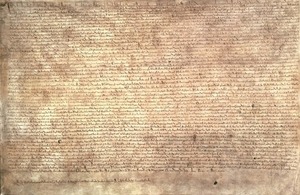British Embassy Sofia celebrates the 800th anniversary of Magna Carta
The Embassy is launching a comprehensive programme dedicated to the principle that no one is above the law.

Magna Carta
In 2015, the UK celebrates 800 years since the sealing of the Magna Carta – the document described as England’s greatest export. Events are taking place around the UK and the world to celebrate the Great Seal anniversary. The British Embassy in Sofia will join the celebrations by running a series of thematic events throughout 2015 to demonstrate the importance of the principle – enshrined in the Magna Carta – that no one is above the law.
Some of the highlights of the celebrations are:
- visits of British Rule of Law experts to Bulgaria and of their Bulgarian counterparts to the UK, to exchange experiences, celebrate judicial traditions and highlight good governance, transparency and accountability; the visits include Bulgarian Justice Minister Ivanov’s attendance at the Global Law Summit and Crown Prosecution Service Prosecutor Jonathan Spicer’s visit to Sofia;
- a Magna Carta exhibition in Sofia that will bring the history and legacy of one of the world’s most celebrated documents to a Bulgarian audience; currently there are exhibitions on the Magna Carta in the British Library and the UK Parliament;
- an initiative to demonstrate the benefits of open data for improving transparency and accountability, as well as reducing the administrative burden on society and business;
- lectures, debates and roundtable discussions with British and Bulgarian historians, academics and legal practitioners, on the Magna Carta and its continued relevance today;
- essay and moot court competitions for students on the Magna Carta topic;
- a comparison of the services a British person can expect from a lawyer in Bulgaria and vice versa to serve as a reference work for citizens visiting or living in the other country.
Sarah Riley, British Charge d’Affaires to Bulgaria, commented:
The Magna Carta signifies the beginning of a law-based society. Embodied in the Rule of Law in over 100 countries, the Magna Carta established for the first time that everyone, even the King, had to obey the law. I am delighted that the British Embassy in Sofia will join the Magna Carta celebrations and add a local angle to them. The Embassy’s 2015 Magna Carta campaign aims to celebrate an important moment in British history and share it with a Bulgarian audience, and underline the importance of the Rule of Law as the foundation of just societies; at the same time we will continue to step up the existing strong co-operation between the UK and Bulgaria on issues related to and dependent on the Rule of Law.
Please join us through our social networking sites in celebrating the Magna Carta campaign:
- The British Embassy in Sofia website
- The British Embassy in Sofia on Facebook
- The British Embassy in Sofia on Twitter
Notes for editors
About Magna Carta
The Magna Carta is one of the founding documents of English law. It was agreed between King John of England and his rebel barons in June 1215. The Magna Carta was written in Latin and subsequently translated into English. Magna Carta contained sixty-three clauses, perhaps the most well-known of which – still part of the law today – for the first time gave all “free men the right to justice and a fair trial”.
Magna Carta is embodied in the Rule of Law in countries from all over the world. It inspired the early American settlers, with its principles echoed in the Declaration of Independence and the Bill of Rights. It has been used to argue for freedom of the press and for extending the vote to ordinary people and to women. Magna Carta is also the foundation of the Universal Declaration of Human Rights. Written after the atrocities of World War II, this declaration states that people around the world are protected by fundamental human rights, regardless of their citizenship, race, gender or beliefs.
What started out as a document of specific complaints from a group of barons has turned into an international symbol of liberty, without which we might not have the rights we value so much today.